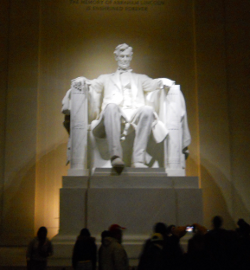What if Abraham Lincoln Had Been A Critical Theorist?
(Lincoln, 1863; Minn, 2011)

Within a comparatively limited temporal and spatial domain, this nation-state transformed a hegemonic praxis based on a conceptualization of the primacy of human agency, contingent on a generalized normalization of rights and capabilities among a class- and gender-defined bourgeoisie.
In light of the violence and contestation of the past two years, a discourse has arisen over the persistence of this specific set of ideologically-based relations. Within the spatial context of this contestation, this ecological space will remain unevenly-developed for the social practice of fetishizing individual suffering as a vicarious justification for continued collective hegemony. This practice fits within the normative, Judeo-Christian discourse that has been dominant since of the inception of this nation-state (Jefferson, 1776).
However, closer examination of this practice reveals a contradiction between the inevitable manifestations of the underlying ideology and the structures supporting the consumptive imperative, producing a collective sense of inadequacy that drives a positive feedback loop. While this particular contribution to the literature is temporally contextualized and constrained, and will have little effect on the larger structures of globalization, it represents a specific disursive instance that will fit within a larger teleological framework, as well as a culturally-persistent artifact of the periodic crises of capitalism.
Indeed, the feedback loop mandates continued surrender of individual agency to the service of the growth imperative, in response to discourses that fetishize previous struggles between competing tribal alliances. Thus, within a statist praxis, the theologically-framed discursive productions of the illusion of agency can persist within the constraints of the dialectic between socially-produced institutions as a multi-generational project, ad infinitum.
Translated back into the vernacular...
Four score and seven years ago our fathers brought forth on this continent, a new nation, conceived in Liberty, and dedicated to the proposition that all men are created equal.
Now we are engaged in a great civil war, testing whether that nation, or any nation so conceived and so dedicated, can long endure. We are met on a great battle-field of that war. We have come to dedicate a portion of that field, as a final resting place for those who here gave their lives that that nation might live. It is altogether fitting and proper that we should do this.
But, in a larger sense, we can not dedicate - we can not consecrate - we can not hallow - this ground. The brave men, living and dead, who struggled here, have consecrated it, far above our poor power to add or detract. The world will little note, nor long remember what we say here, but it can never forget what they did here. It is for us the living, rather, to be dedicated here to the unfinished work which they who fought here have thus far so nobly advanced. It is rather for us to be here dedicated to the great task remaining before us - that from these honored dead we take increased devotion to that cause for which they gave the last full measure of devotion - that we here highly resolve that these dead shall not have died in vain - that this nation, under God, shall have a new birth of freedom - and that government of the people, by the people, for the people, shall not perish from the earth.
Rev 2 July 2011